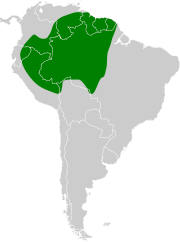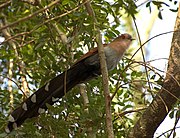Superregnum: Eukaryota
Cladus: Unikonta
Cladus: Opisthokonta
Cladus: Holozoa
Regnum: Animalia
Subregnum: Eumetazoa
Cladus: Bilateria
Cladus: Nephrozoa
Superphylum: Deuterostomia
Phylum: Chordata
Subphylum: Vertebrata
Infraphylum: Gnathostomata
Megaclassis: Osteichthyes
Cladus: Sarcopterygii
Cladus: Rhipidistia
Cladus: Tetrapodomorpha
Cladus: Eotetrapodiformes
Cladus: Elpistostegalia
Superclassis: Tetrapoda
Cladus: Reptiliomorpha
Cladus: Amniota
Classis: Reptilia
Cladus: Eureptilia
Cladus: Romeriida
Subclassis: Diapsida
Cladus: Sauria
Infraclassis: Archosauromorpha
Cladus: Crurotarsi
Divisio: Archosauria
Cladus: Avemetatarsalia
Cladus: Ornithodira
Subtaxon: Dinosauromorpha
Cladus: Dinosauriformes
Cladus: Dracohors
Cladus: Dinosauria
Cladus: Saurischia
Cladus: Eusaurischia
Subordo: Theropoda
Cladus: Neotheropoda
Cladus: Averostra
Cladus: Tetanurae
Cladus: Avetheropoda
Cladus: Coelurosauria
Cladus: Tyrannoraptora
Cladus: Maniraptoromorpha
Cladus: Maniraptoriformes
Cladus: Maniraptora
Cladus: Pennaraptora
Cladus: Paraves
Cladus: Eumaniraptora
Cladus: Avialae
Infraclassis: Aves
Cladus: Avebrevicauda
Cladus: Pygostylia
Cladus: Ornithothoraces
Cladus: Ornithuromorpha
Cladus: Carinatae
Parvclassis: Neornithes
Cohors: Neognathae
Cladus: Neoaves
Ordo: Cuculiformes
Familia: Cuculidae
Genus: Piaya
Species: P. cayana – P. melanogaster
Name
Piaya Lesson, 1830: 139
References
Lesson, R.P. 1830–1831. Traité d'ornithologie, ou, Tableau méthodique des ordres, sous-ordres, familles, tribus, genres, sous-genres et races d'oiseaux : ouvrage entièrement neuf, formant le catalogue le plus complet des espèces réunies dans les collections publiques de la France. F. G. Levrault, Paris. Vol. 1: pp. i–xxxii, 1–659. BHL Reference page. [original description: p. 139]
Piaya is a small genus of relatively large and long-tailed cuckoos, which occur in Mexico, Central America and South America.
Species
The two species in taxonomic order are:
| Common name | Scientific name and subspecies | Range | Size and ecology | IUCN status and estimated population |
|---|---|---|---|---|
| Squirrel cuckoo
|
Piaya cayana (Linnaeus, 1766) |
northwestern Mexico to northern Argentina and Uruguay, and on Trinidad. |
Size: Habitat: Diet: |
LC
|
| Black-bellied cuckoo
|
Piaya melanogaster (Vieillot, 1817) |
Amazon basin and Guyana Shield. |
Size: Habitat: Diet: |
LC
|
The little cuckoo has been found to be closer to some species traditionally placed in Coccyzus or Micrococcyx. These are now again separated in Coccycua.
Description and ecology
These birds are birds with relatively slender bodies, long tails and strong legs. The black-bellied cuckoo is essentially restricted to rainforest, but the more widespread squirrel cuckoo also occurs in other forest types, woodlands or mangroves.
Piaya cuckoos, unlike many Old World species, are not brood parasites; they build their own nests in trees and lay two eggs. Parasitic cuckoos lay coloured eggs to match those of their passerine hosts, but the non-parasitic Piaya species, like most other non-passerines, lay white eggs.
These are vocal species with persistent and loud calls. They feed on large insects such as cicadas, wasps and caterpillars (including those with stinging hairs or spines which are distasteful to many birds). Squirrel and black-bellied cuckoos are large and powerful species, and occasionally take vertebrate prey such as small lizards.
References
ffrench, Richard (1991). A Guide to the Birds of Trinidad and Tobago (2nd ed.). Comstock Publishing. ISBN 0-8014-9792-2.
Hilty, Steven L (2003). Birds of Venezuela. London: Christopher Helm. ISBN 0-7136-6418-5.
Stiles and Skutch, A guide to the birds of Costa Rica ISBN 0-8014-9600-4
"Cuculidae". aviansystematics.org. The Trust for Avian Systematics. Retrieved 2023-08-05.
Retrieved from "http://en.wikipedia.org/"
All text is available under the terms of the GNU Free Documentation License



